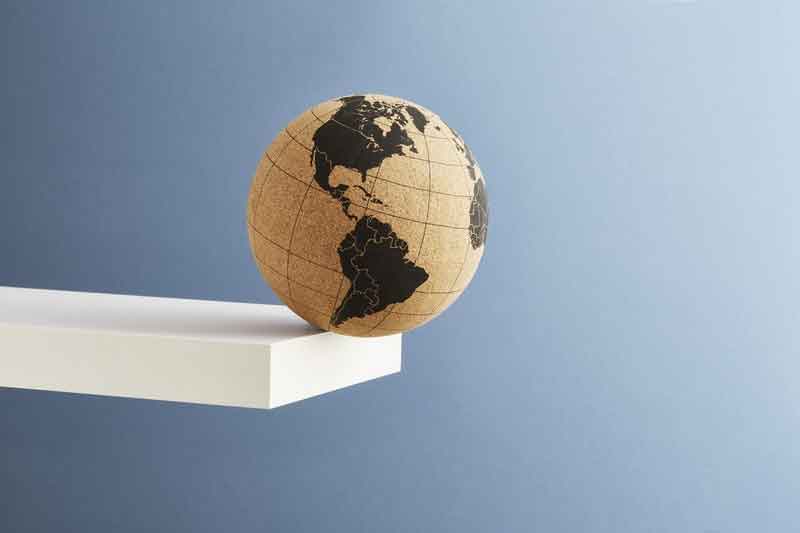
Since the start of the COVID-19 pandemic, Russia’s invasion of Ukraine, and the resulting disruption of multiple global supply chains, policy think tanks have increasingly adopted the term polycrisis to signify humanity’s destabilized status quo. The World Economic Forum’s 2023 Global Risk Report uses the newish word 13 times in 90 pages. Scholars from a range of disciplines (including Columbia University historian Adam Tooze) have written about the polycrisis, and both Cascade Institute and Omega Institute have published papers and reports on it. The Cascade Institute notes that “a global polycrisis occurs when crises in multiple global systems become causally entangled in ways that significantly degrade humanity’s prospects. These interacting crises produce harms greater than the sum of those the crises would produce in isolation, were their host systems not so deeply interconnected.”
Evidence of polycrisis is usually separated into two buckets—environmental and social. Signs of environmental crisis include climate change, the disappearance of wild nature, relentless resource depletion, the increasing chemical pollution of air and water, soil loss and degradation, and fresh water scarcity. Evidence of social crisis includes increasing economic inequality, poverty, racism and other forms of discrimination, the rise of authoritarianism, and impacts of rapid technological change (such as automation).
Our current set of crises can be described as a polycrisis because self-reinforcing feedbacks between ecological breakdown and social breakdown are strengthening and growing more numerous. For example, climate-driven human migration presents challenges to political systems while also eroding traditional cultural norms that support environmental stewardship. Societies in the midst of social crisis, and ones turning toward authoritarian regimes, are seldom able to muster efforts toward resource conservation, emissions reduction, and habitat preservation; indeed, under such circumstances, past efforts in these directions may be undermined.
All of this is happening in the wake of a couple of decades’ worth of historical studies that show societal collapse to be a normal, predictable, and even inescapable periodic occurrence throughout the past few thousand years. It appears that societies tend to become more complex, develop new technologies, accumulate wealth, and grow more unequal over time. Their leaders start to quarrel with one another, weakening overall social cohesion. Finally, after two or three centuries of this, almost anything can push a society over the brink—a natural disaster, resource depletion, war, insurrection, epidemic, or financial crash. Scholars who engage with the accumulating literature on societal collapse can hardly help noting the relevance for today’s world. We’ve built a global civilization of unparalleled complexity, wealth, and inequality, all based on depleting, polluting fossil fuels. What could go wrong?
An early warning came in 1972 with the publication of The Limits to Growth, a report by MIT system dynamics scientists on their efforts to model the likely future interactions between population growth, consumption growth, and resource depletion. Their computer-based scenarios suggested, under business-as-usual conditions, global industrial society would likely collapse during middle decades of the 21st century.
A new report by Post Carbon Institute (PCI), Welcome to the Great Unraveling: Navigating the Polycrisis of Environmental and Social Breakdown (full disclosure: I’m one of the authors), seeks to build a coherent narrative about the roots of the polycrisis, the signs of its arrival and evolution, and why we should be thinking differently about the future. When confronted with evidence that our collective path is unsustainable, many of us tend to jump to “all-or-nothing” ways of thinking, sometimes framing our future in simplistic terms as “the end of the world” or “apocalypse.” But according to the report’s authors, this tendency is unhelpful. While a complete and sudden end of humanity is theoretically possible via nuclear war, our more likely future will consist of decades of social, economic, political, and ecological turmoil punctuated by periods of rescue and recovery. There is still considerable divergence between best- and worst-case scenarios, and we still have agency to affect outcomes.
According to the PCI report, we should be spending far less effort building upon expectations of a future that looks much like today only with more technology, mobility, and wealth; instead, we should devote our collective brainpower to questions like, How does a civilization downsize gracefully? Or, What have we achieved that our distant descendants would like us to preserve for them?
Maybe we’d be better off avoiding the word “collapse” altogether, since it tends to be disempowering. Nate Hagens, who interviews polycrisis experts on his podcast, terms the era we are entering “The Great Simplification.” Regardless what we call it, this will be a time that calls for new attitudes and behaviors. Strategies that seemed to make sense before the polycrisis, such as efforts to grow national economies, will need to be replaced by different ones, such as efforts to build resilience. Fortifying resilience at the community level will be especially important: as global supply chains grow brittle and shatter, humanity will depend more upon local economies for survival and opportunities to thrive. Cooperative strategies to ration scarce resources and reduce inequality will also be required so as to defuse conflict and ensure optimal outcomes for as many as possible.
If humanity descends into blame and desperate efforts to maintain a status quo that by its very nature cannot persist, the future looks dark indeed. Imagine what a young person a few decades from now, living in a depleted and ravaged world, might feel while looking at surviving images of today’s “influencers” enjoying comfort, convenience, and privilege on an epic scale. However, if we work together now to build a truly sustainable way of life, maybe future generations will have at least some reasons to thank us.
















































